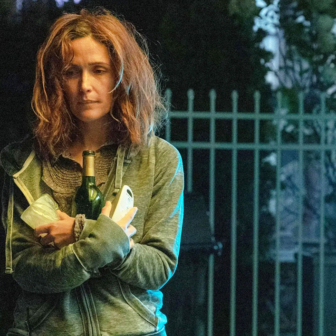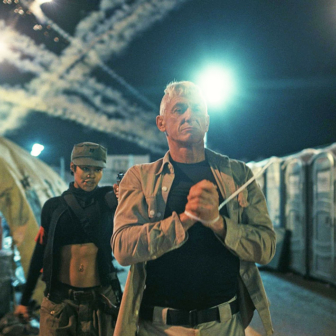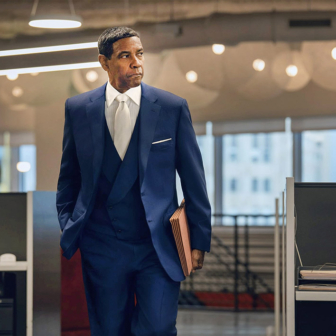In recent weeks, two new Australian films have quietly called for — and deserved — our attention. They are Kangaroo (at least the third film with that title in our cinema history) and The Travellers, and both are unpretentious, sensitive, and subtly written and directed, each with elements of comedy and poignancy, and quietly rendered in a way that is not all that common or recognised in our films. A long way from, say, The Man from Snowy River or Mad Max.
Director Kate Woods, who has worked primarily in TV apart from her 2000 feature Looking for Alibrandi, has produced something of a charmer in her new film Kangaroo. This is a semi-biographical account of a man’s life and its preoccupations and how these can change dramatically. It is not a conventional biopic but, as an opening title says, it was “inspired” by a true story.
Two opening episodes introduce the film’s protagonists. In the first of these, preceding the film’s title, a young Indigenous girl we’ll come to know as Charlie (Lily Whiteley) is seen running in a panoramic vista of outback Australia, with kangaroos bounding along too. Following the film’s title, the scene cuts to Bondi Beach, where Chris Masterton (Ryan Corr), a TV weatherman, is delivering his report with Liz, perhaps the program’s coordinator (Brooke Satchwell).
Charlie and Chris both have their problems. Events, one related to the death of a dolphin, have led to Chris losing his job in Sydney TV. He heads off west to take up another job, but on the way, in what will be a life-changing moment, he accidentally knocks over a kangaroo. He retrieves a joey from the kangaroo’s pouch and drives into the next outback town, Silver Gum, where there proves to be no vet.
Chris’s car will take a week to fix, says local mechanic Uncle Dave (Ernie Dingo), so he’s not off to a good start. He also gets a seriously unwelcoming greeting from Jesse (Rachel House), who runs the local pub.
Young Charlie, meanwhile, is not joining in school games or showing any interest in the town, where she has only recently come to live after losing her father. She carries with her a pet joey. Her mother Rosie (Deborah Mailman) is doing her best to help her to adjust to her new community.
Charlie and Chris become friends around their care for their joeys. The growth of this friendship is articulated with sympathy and total credibility in Henry Cripps’s screenplay and in Kate Woods’ direction — and in the performances of Ryan Corr and Lily Whiteley, the source of the film’s warmth of feeling.
Other characters, played by some of Australia’s best actors and vividly captured in Keiran Fowler’s cinematography, also engage our attention. Perhaps most notable is Deborah Mailman, who imbues Charlie’s mother with a wholly persuasive sympathy and common sense as she tries to help her to adjust to the change in her life. Prolific character actor Roy Billing is amusing and engaging as a sort of local guru, mainly located in the pub from which he is a source of information for kids seeking help with their school projects. And several others contribute to the film’s tone.
The film moves to a gratifying close without being at all sentimental. There is plenty of enjoyable action and many superb vistas along the way. The concluding title confirms its real-life inspiration by naming Chris “Brolga” Barns and his wife, who maintain a kangaroo sanctuary in the Northern Territory. Kangaroo is an engaging mix of fact and fiction.
Directed and written by one of the pioneers of Australian film, Bruce Beresford, The Travellers also conveys warmth and subtlety. Apart from the popular Barry McKenzie comedies, Beresford also directed such key films of the 1970s and 80s as Don’s Party, The Getting of Wisdom and Breaker Morant, and, in the United States, the Oscar-winning Driving Miss Daisy. He was noted for his versatility in terms of genre and setting. Now in his eighties, he is as proficient as ever in his new film, the first since the engaging Ladies in Black in 2018.
The Traveller opens with a man arriving at a hotel in Perth. He proves to be an opera stage designer called Stephen Seary (Luke Bracey) who is arriving from London on the way to Yarrabiddy, the small town he grew up in, to see his dying mother in hospital. His background in opera and its later representation in the film recalls Beresford’s own career in opera production, as does his moving between Australia and abroad in the interests of work.
Before visiting his mother Stephen calls at his father’s house, which is in the most chaotic mess. Fred, the father (Bryan Brown), seems never to have got rid of anything in his years of living alone. Much of the film is concerned with family relations between Stephen and his grumpy dad and his forceful sister Nikki (played by Susie Porter), but he also renews acquaintance with a couple of long-ago schoolmates. These characters are sharply delineated, enabling the viewer to absorb the shifting relationships or accept their professional lives, including Stephen’s as opera designer — and even Fred’s claim “I wanted to be an actor.”
The film conjures with the idea of old age and how those who have reached it have to be handled. Mum’s doctor says her condition is largely a matter of old age. Stephen tries to talk Dad into going to live in “a home” but Dad insists that he can cope, though in one comic episode this is clearly arguable: he is seen showering fully dressed, claiming that this way both body and clothes are washed. The film deals thoughtfully with children’s responsibility for aged parents.
In a visually effective episode, an estate agent drives Stephen to inspect such a home. Peter James’s ravishing cinematography captures the beauty of the setting, not as pictorialism but almost as recognition of the potential beauty of life at any age.
Among a cast full of excellent performances, Luke Bracey’s Stephen — always ready for female intimacy as well as getting on with his Traviata-based work — is subtly and sympathetically played, but Bryan Brown gives perhaps the most stunning performance of his long and prolific career. He imbues Dad with testiness, obstinacy, real feeling — in other words with life.
And speaking of prolific careers, Beresford’s screenplay and direction suggest there could be years of quality production still to come. The Travellers has warmth and subtlety along with touches of humour and moments of poignancy, offering a rewarding study of family relations and visual and vocal delights along the way. •




